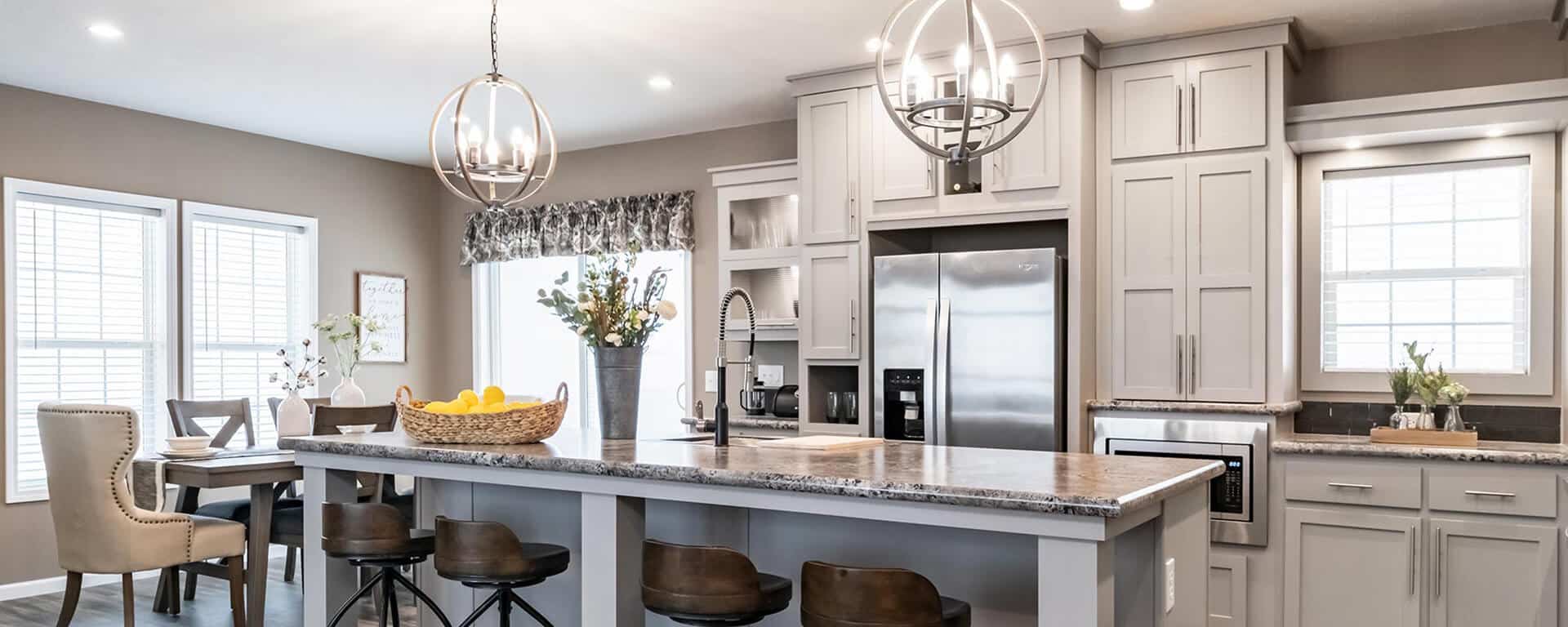The Pros And Cons Of Living In A Manufactured Home: What To Consider
Smartsites webuser
march 20, 2024

Choosing the right home is a significant decision for anyone, and manufactured homes present a unique set of advantages and drawbacks. This article explores the essential pros and cons of manufactured homes to help prospective homeowners make informed choices. With advancements in construction and design, manufactured homes have become a popular option for many, offering affordability and flexibility.
Affordability
One of the most appealing aspects of manufactured homes is their affordability. When compared to their traditional stick-built counterparts, manufactured homes often come at a lower price point. This affordability can make homeownership more accessible for first-time buyers or those on a tight budget.
The cost-effectiveness of manufactured homes extends beyond the initial purchase price. Many find that the maintenance, insurance, and property taxes for these homes are also lower, contributing to long-term savings.
Customization
Manufactured homes offer a significant degree of customization. Buyers can choose from various floor plans and design options to suit their tastes and needs. This flexibility allows individuals to personalize their living spaces without the higher costs associated with customizing traditional homes.
Customization options are not just limited to cosmetic features. Prospective homeowners can also select energy-efficient appliances and materials, contributing to reduced utility costs and a smaller environmental footprint.
Speed of Construction
Another advantage is the speed of construction. Manufactured homes are built in a controlled factory environment, which significantly reduces building time. This means homeowners can move into their new homes much sooner compared to the lengthy construction process of site-built homes.
The controlled environment also minimizes the risk of construction delays due to weather or other external factors. This efficiency ensures a smoother and more predictable home-buying and building process.
Transportability
Transportability is a feature unique to manufactured homes. While not all owners choose to move their homes, the possibility exists. This can be particularly appealing for those who value mobility or may need to relocate in the future.
However, it is essential to note that moving a manufactured home involves costs and logistical planning. Despite this, the option for mobility remains an attractive feature for certain homeowners.
Community Living
Many manufactured homes are situated in communities with shared amenities such as parks, pools, and clubhouses. Living in such communities can foster a sense of belonging and provide opportunities for social interaction. These communal benefits can enhance the living experience for residents.
Moreover, manufactured home communities often have management teams responsible for maintaining common areas and facilities. This can relieve homeowners of some maintenance responsibilities, allowing more leisure time.
Perception and Stigma
Despite their many benefits, manufactured homes can carry a stigma. Some people perceive them as inferior to traditional homes, which can affect community acceptance and home values. This perception is changing slowly, but it remains a consideration for potential buyers.
The stigma associated with manufactured homes can also impact resale value and financing options. While not universally true, it is an aspect that prospective homeowners should be aware of.
Financing Challenges
Obtaining financing for a manufactured home can be more challenging than for a traditional home. Some lenders have stricter requirements for loaning money for manufactured homes, particularly if the home is not affixed to a permanent foundation.
However, various financing options are available, including FHA loans and programs specifically designed for manufactured home buyers. Prospective buyers should research and consult with financial institutions to understand their options.
Depreciation
Unlike traditional homes, which typically appreciate over time, manufactured homes can depreciate. The rate of depreciation varies, influenced by factors such as location, maintenance, and the housing market. This potential for depreciation is an important consideration for those looking at manufactured homes as an investment.
However, the land on which a manufactured home is placed can appreciate, potentially offsetting the home’s depreciation. This highlights the importance of location in the decision-making process.
Sustainability and Environmental Impact
Manufactured homes are increasingly recognized for their sustainability and reduced environmental impact. These homes are built in a factory setting, which allows for more precise material usage and less waste. Additionally, the ability to incorporate energy-efficient windows, insulation, and appliances directly into the manufacturing process contributes to a greener lifestyle for homeowners.
The controlled construction environment not only reduces waste but also minimizes the energy used during the building process. This efficiency is a key factor in the growing appeal of manufactured homes among environmentally conscious buyers. As sustainability becomes a more pressing concern globally, the environmentally friendly nature of manufactured homes presents a compelling advantage.
Quality and Safety Standards
Recent advancements in the construction of manufactured homes have led to significant improvements in quality and safety. Manufactured homes must adhere to strict federal standards set by the HUD, ensuring they meet specific criteria for durability, fire resistance, and energy efficiency. This rigorous oversight helps guarantee that these homes are not only affordable but also safe and reliable.
The HUD code has evolved to include provisions for wind safety in hurricane-prone areas, making manufactured homes a viable option in regions affected by severe weather. These improvements in quality and safety standards provide peace of mind for homeowners, knowing their residence is built to withstand various conditions. This aspect is especially important in areas where traditional homes may face challenges meeting these standards without significant additional costs.
Land Ownership and Placement Issues
One of the considerations when opting for a manufactured home is the issue of land ownership and placement. Homeowners may choose to place their manufactured home on a leased lot within a community, which can offer the benefit of shared amenities but might come with monthly fees and less control over the land. Alternatively, buying land for a manufactured home requires navigating zoning laws and ensuring the land is suitable for placement, which can add complexity and cost to the process.
The decision between leasing and owning land has significant implications for long-term stability and investment value. Owning the land can lead to appreciation in value over time, while leasing offers less financial commitment upfront but may involve ongoing costs and restrictions. This balance between flexibility and investment is a critical consideration for prospective manufactured home owners.
Resale Value and Market Perception
The resale value of manufactured homes is a complex issue influenced by market perception, the home’s condition, and its foundation type. Manufactured homes on permanent foundations tend to hold their value better and may even appreciate under the right market conditions. However, those on leased land or without a permanent foundation generally face greater depreciation.
Market perception of manufactured homes is evolving, with many recognizing their quality and value. Yet, this shift in perception is gradual, and stereotypes about manufactured homes still exist, potentially affecting resale value. Prospective buyers should consider these factors when evaluating a manufactured home as a long-term investment.
Insurance and Financing Options
Insurance for manufactured homes can differ from traditional home insurance, with specific policies tailored to their unique construction and setup. These policies may cover the home itself, personal property within, and liability, but the rates and coverage options can vary widely. It’s important for homeowners to shop around and understand the specific insurance requirements and options for manufactured homes.
Financing options for manufactured homes have expanded, offering more opportunities for buyers to secure mortgages and loans. Specialized programs, including those offered by government agencies, can provide favorable terms, but buyers should be aware of the potential for higher interest rates or down payment requirements compared to conventional housing loans. Understanding the nuances of insurance and financing for manufactured homes is crucial for making an informed decision.
Community and Lifestyle
Living in a manufactured home often means being part of a community with shared amenities and a sense of neighborhood. These communities can offer recreational facilities, social events, and a built-in support system, enhancing the quality of life for residents. The sense of belonging and community spirit is a significant draw for many considering manufactured home living.
However, community living also comes with rules and regulations set by park management, which can impact one’s lifestyle and home customization options. While some appreciate the structure and amenities these communities provide, others may prefer more autonomy over their living environment. Balancing the benefits of community amenities with the desire for personal freedom is another consideration for prospective residents.
Maintenance and Upkeep
Manufactured homes, like any residence, require maintenance and upkeep to ensure their longevity and comfort. The materials and construction methods used in manufactured homes can sometimes necessitate specific maintenance practices, particularly for homes not on permanent foundations. Understanding these requirements is essential for keeping a manufactured home in top condition.
The compact nature of many manufactured homes can make maintenance more manageable compared to larger, traditional homes. However, homeowners should be proactive about routine upkeep and address any issues promptly to prevent costly repairs down the line. This ongoing maintenance is a key aspect of manufactured home ownership, contributing to both the home’s aesthetic appeal and its structural integrity over time.
Technological Advancements and Modern Amenities
Manufactured homes have benefited from technological advancements, allowing for modern amenities and smart home features to be integrated into their design. From energy-efficient appliances to state-of-the-art heating and cooling systems, these homes can offer the same level of comfort and convenience as site-built homes. The ability to incorporate such technologies during the manufacturing process can enhance the living experience while promoting sustainability.
Smart home technology, including security systems, thermostats, and lighting controls, can easily be included in new manufactured homes. This integration of modern technology not only improves functionality but also adds to the attractiveness of manufactured homes for tech-savvy buyers. As technology continues to advance, the potential for even more innovative features in manufactured homes grows, making them an appealing option for those seeking a modern, connected lifestyle.
Adaptability to Diverse Lifestyles
Manufactured homes offer unparalleled adaptability to suit a wide range of lifestyles, from retirees seeking a tranquil community setting to young families needing an affordable start. The diverse floor plans and customization options available allow for a personalized home that can evolve with a homeowner’s changing needs. This flexibility makes manufactured homes an attractive option for individuals at various stages of life, ensuring that their living space can adapt to different life events and requirements.
Energy Efficiency
One of the significant benefits of modern manufactured homes is their energy efficiency. Manufacturers can integrate advanced insulation techniques, energy-efficient windows, and HVAC systems directly into the design, significantly reducing energy consumption. This not only helps in lowering utility bills for homeowners but also contributes to a smaller carbon footprint, aligning with growing environmental sustainability concerns.
Taking Advantage of the Benefits
Manufactured homes offer a mix of affordability, customization, and community living, with some challenges related to perception, financing, and depreciation. As the housing market evolves, so do the options for prospective homeowners.
Understanding the pros and cons of manufactured homes is crucial for making an informed decision that aligns with your lifestyle and financial goals. Reach out to Ignite MHC today and together we can navigate the journey towards homeownership in a manufactured home.
